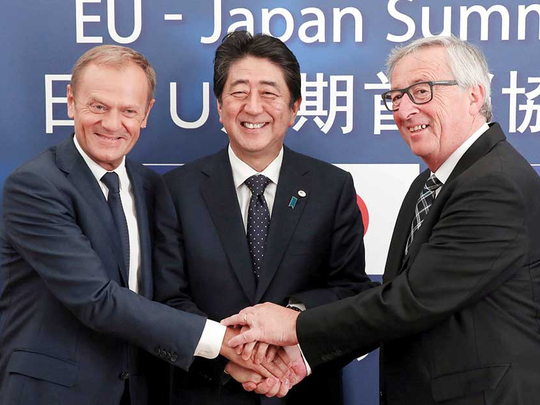
Brussels, Paris: General Electric Co., Merck, Sigma-Aldrich Corp. and Canon Inc. are the latest companies to risk hefty penalties as the European Commission clamps down on violations of its merger approval procedures.
Months after the EU fined Facebook $125 million (Dh459 million) for giving misleading information during a deal review, regulators accused GE of doing the same during the review of its 1.5 billion-euro takeover of LM Wind Power, the European Commission said on Thursday.
Merck and Sigma-Aldrich also got objections for failing to provide information on a research project for chemicals during a 2015 merger review, it said. A third complaint went to Canon, which implemented the takeover of a Toshiba unit before getting approval.
“We can only do our job well if we can rely on cooperation from the companies concerned — they must obtain our approval before they implement their transactions and the information they supply us must be correct and complete,” said EU Competition Commissioner Margrethe Vestager.
Possible fines
While General Electric, and Merck and Sigma-Aldrich risk a fine of as much as 1 per cent of annual worldwide sales, Canon’s penalty could climb up to 10 per cent of sales. The EU said however that the investigations won’t have an impact on its approval of the three mergers, which will remain effective.
Vestager signalled a zero tolerance approach to companies that give inaccurate information when she fined Facebook on May 18 for combining WhatsApp data with its other services after having told the merger officials otherwise during the EU’s 2014 review. The social network said it acted in good faith and won a lower fine after cooperating with regulators.
GE’s push into the wind industry comes after the Boston-based firm took over Alstom Renewable Power Sector as part of its $10-billion acquisition of Alstom SA’s power operations two years ago. GE renamed the unit, which produces 6MW offshore wind turbines, GE Renewable Energy.
GE said the company “acted in good faith” with “no intent to mislead,” according to a statement, adding that it will continue its “constructive cooperation” with the EU.
The Commission also said in its preliminary view Canon used a so-called “warehousing” two-step transaction structure involving an interim buyer, which essentially allowed it to acquire Toshiba Medical Systems prior to obtaining the relevant merger approvals.
Canon said in a statement that it will respond in “due course” and that it can’t comment further until there’s a final EU decision. Japan’s Fair Trade Commission warned Canon last year for implementing the Toshiba deal before seeking regulatory approval.
Merck and St. Louis-based Sigma-Aldrich are suspected of failing to provide the commission with important information about an innovation project with relevance for certain laboratory chemicals at the core of the EU’s analysis.
Merck will review the commission’s decision before responding, but “is confident this issue will be resolved in a satisfactory manner,” it said in a statement. The company “has acted in good faith since the anti-trust process” started and “is committed to a constructive dialog” with the commission.












